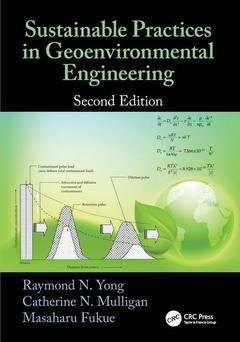Description
Sustainable Practices in Geoenvironmental Engineering (2nd Ed.)
Authors: Yong Raymond N., Mulligan Catherine N., Fukue Masaharu
Language: English
Subjects for Sustainable Practices in Geoenvironmental Engineering:
Keywords
Soil Quality; Soil Contamination; GEOENVIRONMENT MANAGEMENT AND SUSTAINABILITY; Natural Attenuation; STRESSORS AND SOIL CONTAMINATION; Land Environment; SUSTAINABLE WATER MANAGEMENT; Organic Chemical Contaminants; INDUSTRIAL ECOLOGY AND THE GEOENVIRONMENT; Contaminant Plume; NATURAL RESOURCES EXTRACTION – STRESSORS AND IMPACT MANAGEMENT; Biotic Receptors; Moisture Content; Soil Water System; Geoenvironmental Impacts; Energy Sources; Soil Fractions; Microstructural Unit; Te Ch; Soil Solids; Stressor Sources; Slurry Tailings; SS; Log Koc; SQI; Unconfined Compressive Strength; Engineered Clay Barrier; Downstream Industries; Coastal Marine Environment; Sand Lance
87.11 €
In Print (Delivery period: 14 days).
Add to cartPublication date: 04-2017
· 17.8x25.4 cm · Paperback
232.80 €
In Print (Delivery period: 15 days).
Add to cartPublication date: 10-2014
562 p. · 17.8x25.4 cm · Hardback
Description
/li>Contents
/li>Readership
/li>Biography
/li>
In the seven years since the publication of the first edition of Sustainable Practices in Geoenvironmental Engineering, the combination of population growth and increased exploitation of renewable and non-renewable natural resources has added increased stresses on the quality and health of the geoenvironment. This is especially true when viewed in the context of the growing demand for food and shelter, energy and mineral resources, and their resultant effects on the natural capital of the geoenvironment. Completely revised and updated, this second edition of a bestseller introduces and discusses the concept of "stressors" and their impacts on the geoenvironment.
See What?s New in the Second Edition:
- Clear definition of the geoenvironment
- New tools and remediation technologies, new management methods for geohazards, and enhanced coverage of social and economic sustainability
- Innovative approaches and techniques for reaching geoenvironmental sustainability
- More detail on treatment technologies, both in situ and ex situ
- Discussion on the mitigation of geodisasters
- Additional sections to discuss sustainability assessment protocols
- Updated information on models for prediction of contaminant behavior
The authors explore the technologies that take into account targets, exposure routes (if applicable), future land use, acceptable risks, legislation, and resultant emissions/discharges in establishing the criteria and tools for evaluating technologies and protocols for environmental management of the impacted land. They then discuss how to choose the correct ones to use in different situations to protect the quality and health of natural resource and capital of the geoenvironment and ensure that these geoenvironmental natural resources and capital remain available for future generations and to develop innovative and sustainable techniques to make land more stable and safer.
Geoenvironment Management and Sustainability. Stressors and Soil Contamination. Sustainable Water Management. Industrial Ecology and The Geoenvironment. Natural Resources Extraction – Stressors and Impact Management. Agricultural-Based Food Production Geoenvironment Stressors. Urbanization and The Geoenvironment. Coastal Marine Environment Sustainability. Contaminants and Land Environment Sustainability Indicators. Geoenvironment Impact Mitigation and Management. Remediation and Management of Contaminated Soil. Sustainable Ground Improvement Technique for Geo-Disaster Mitigation. Sustainable Geoenvironmental Engineering Practice.
Dr. Raymond N. Yong is the William Scott Professor Emeritus at McGill University, Canada, and Emeritus Professor at the University of Wales Cardiff (Cardiff University), UK. He has authored and co-authored eleven other textbooks, over five hundred refereed papers in the various journals in the disciplines of Geoenvironmental Engineering and Earth Science, and holds 52 patents. He is a Fellow of the Royal Society (Canada), and a Chevalier de l’Ordre National du Québec. He and his students were amongst the early researchers in Geoenvironmental Engineering engaged in research on the physico-chemical properties and behaviour of soils, their use in buffer/barriers for HLW (high-level radioactive waste) and HSW (hazardous solid waste) containment and isolation, and restoration/remediation of contaminated sites. He and his colleagues are currently engaged in research on Geoenvironmental sustainability.
Dr. Catherine N. Mulligan holds a Concordia Research Chair in Geoenvironmental Sustainability (Tier I) and is Full Professor and Associate Dean, Research and Graduate Studies of the Faculty of Engineering and Computer Science of Concordia University, Canada. She has authored more than 80 refereed papers in various journals, authored, co-edited or co-authored five other books, holds three patents and has supervised to completion more than 40 graduate students. She is the Director of the new Concordia Institute of Water, Energy and Sustainable Systems. The new Institute trains students in sustainable development practices and performs research into new systems, technologies and solutions for environmental sustainability.
Dr. Masaharu Fukue is a Full Professor at Tokai University, Japan. He has studied and taught geoenvironmental engineering and geotechnical engineering for 36 years, since 1978, in Marine Science and Technology, Tokai University. He has co-authored two other textbooks, over one hundred refereed papers in various journals, and holds 6 patents. H




